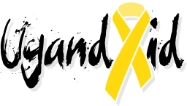Slum Schools
/Two schools visits for us today. This morning to Walukuba East Primary and this afternoon to Masese Primary. Both within the main slum area of Jinja.
When we arrived a Walukuba, having met Headtecher Alice last week, she was happy for us to wander unaccompanied around the school. It was quite sobering to be met with slogans painted on the walls about abstaining from pre-martial sex and having sex for gifts, these are primary aged children.
After a wander through the play areas at break time it was time to teach. I don't think either of us was prepared for what was come. we were both placed in P4 classes with 90 in mine and 99 in Dylan's! The teacher stayed with Dylan but mine disappeared for a while and was then in and out on her phone. We were there to lead a lesson on letter writing to children at Walukuba's partner school, Bowden CE Primary in Manchester (Dylan's School). We had established during our earlier wanderings that the children were not used to free creative writing at all. Everything is copied from the board, identical in each book, even if the child cannot read what they are writing. So our plan was to model writing a letter and our thinking processes, leaving them with a frame to write their own and personalise it for themselves. This worked to a degree but with 90+ children, who were all on task, it was hard physically to move around the classroom to provide support. I asked the teacher about the range of ages and abilities in the class. They were aged 8-15 with some late starters and some 'slow learners' (her words). She then shouted for them to stand up to identify them to me, humiliating them in front of all the others. This was heartbreaking. She turned her back on them and I smiled at them, gave them a thumbs up and motioned for them to sit down. I stopped asking questions but a little bit later went to both to look at their letters praising them for their work. This was a teacher with the whipping sticks prominently displayed in the classroom. Very different to any other classes we have been in but I understand from those more experienced than I, that this kind of thing is common in Uganda.
Dylan's experienced similar difficulties with supporting the class with the letter writing task given the number of children in a space designed for far less.
The children were very engaged in the process and excited about the possibility of a new friend in the UK. We left with a pile of letters which, when answered will bring joy to the writers in both countries.
In the afternoon 7 of us travelled to Masese Primary school. It is on a hill overlooking the slum. The children are mainly from the Karamojong tribe in the North, and are shunned by many other groups in Uganda. There the Headteacher and Deputy showed the main UgandAid group around the school while Dylan and I were taken to different classes to lead sessions. We had to quickly think on our feet as the letters had already been written by the children and we ended up with a Q&A session on similarities and differences between the UK and Uganda. The children asked some amazing questions ranging from the weather, our families and friends, the food and what lessons do the children learn? To; can you take me back with you? and do the teachers have sticks in the UK? Showing once again some of the major major problems in this society.
The Headteacher ended the tour at the dormitories for vulnerable children. 26 are currently living full time at the school. This is an arrangement that Headteacher Christine has instigated to ensure those most at risk from sexual exploitation or other abuse, remain safe. She outlined some horrendous stories of the abuse of children who were 'saved' by the school.
At the end of our time at the school we collected Dylan (who was still going strong!!). He had moved on to talking about Ireland, so had much to say!
On Thursday we visited Spire Road Primary, who have a department catering for partially-sighted and blind children. It was fantastic to see these children included in mainstream lessons with the rest of the children, although their braille machines looked particularly dated.
Our overwhelming impression of these schools, who are all very different yet similar in many ways, is the genuine enthusiasm, motivation and interest of the children.
We have received an amazing welcome everywhere. It will be very hard to go back to the UK and face classes of 30 children, some of whom don't want to be there. As well as meetings with school leaders who always have numerous complaints about the system, funding etc. Having witnessed settings that could not be further from the immensly privileged position we come from, it will be a challenge not to remind them that they really should be grateful for the opportunities and wealth of resources they have!



